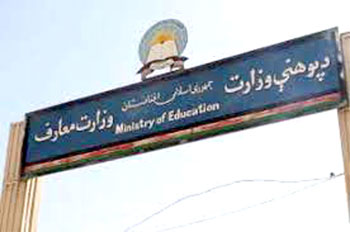The Ministry of Education in a statement called for the observation of Hijab by female teachers and the prohibition of neckties among male students and teachers.
However, an official at the MoE told TOLOnews that this was just at the level of instruction and not compulsory.
“The statement which was issued by the Kabul department of education regarding the Hijab and usage of ties, it was just aimed as instruction,” said Ihsanullah Khitab, head of the Kabul department of education.
The (MoE) also denied that there has been a change in the curriculum, but said it expects some possible changes in the curriculum next year.
“As it is a normal routine in the world also, there may be changes in the curriculum for the next year,” said Aziz Ahmad Riyan, MoE spokesman.
Kabul residents shared their views:
“The tie shows discipline for the school students,” said a resident.
“The new decision of the Ministry of Education to impose new restrictions on the appearance of teachers and students is not a logical decision,” said Hekmatullah Mirzad, a university instructor.
Despite it being nearly one month from the start of the school year, female students above grade 6 have yet to be allowed to attend their schools.
The ban on schooling for female students beyond grade six continues to face strong national and international condemnation.
The UNHCR said the closing of schools for girls in grades 7-12 is contrary with the commitment made by the Islamic Emirate with the international community.
“We are extremely worried about the situation for women and girls. They are facing heightened risk and challenges affecting their ability to move around freely and to work,” said Shabia Mantoo, a spokesperson for the United Nations Refugee Agency.
The Islamic Emirate said it is working on a plan to pave the way for the reopening of schools for girls beyond grade six.
“The Islamic Emirate is making serious efforts to form a mechanism in a bid to reopen schools for female students in grades 7-12 under an Islamic structure and based on Afghan tradition,” said Aziz Ahmad Riyan, a spokesman for the Ministry of Education.
This comes as Amnesty International called on the international community to prioritize women’s rights and girls’ access to education in a meeting with the current Afghan officials.
Amnesty International said that women’s rights were violated since the Islamic Emirate came into power.
“We are witnessing the violation of all rights for women and girls. The Taliban didn’t live with their promises regarding reopening the schools for girls. The international community must put women and girls’ rights as its redline in the meetings with the Taliban. We urge the international community to hold the Taliban accountable,” said Samira Hamidi, a member of Amnesty International.
This comes as Abdul Bari Jahani, former Minister of Information and Culture, in an open letter to the Islamic Emirate expressed his concerns over the current situation in Afghanistan and the closing of schools for girls, saying the country’s development is impossible without girls’ access to education.
An Indian newspaper The Print reported that more than two dozen senior members of the Islamic Emirate are sending their daughters to school in Doha, Qatar as well as Karachi and Peshawar of Pakistan.
“This is propaganda and not true,” said Bilal Karimi, deputy spokesman for the Islamic Emirate.
“We call on the Islamic Emirate to immediately reopen the schools for girls because as much as we improve our knowledge, our girls and country will be developed,” said Meena Habib, a women’s rights activist.
“Their children are in a calm situation and are making progress. They have no worries. But they don’t consider the girls who are living in Afghanistan,” said Sanowbar, a women’s rights activist.
On March 23rd, female students beyond grade six were not allowed to attend their schools.










